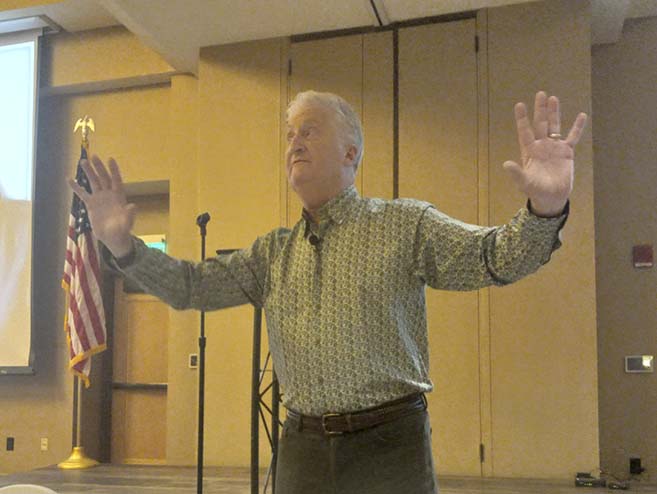
By DON FLETCHER
News Staff Writer
“Remember, you can’t believe everything you think.”
Noted author Andy Andrews, who has written 26 fiction and non-fiction books, used that statement as a theme as he delivered life lessons cloaked in humor to the March 9 gathering of United Bank’s Joint Advisory Committee members and their guests at Wind Creek’s main conference room.
Andrews’s books contain a hodgepodge of stories about the choices individuals make, good and bad, that can affect their lives long past the point of making them. He says humans have little control over the events that shape their lives.
The consultant, in-demand speaker and coach for some of the world’s major business and governmental entities, has spoken at the request of four U.S. presidents and has worked extensively with the U.S. Department of Defense. His writings range in category from hardcover fiction and nonfiction to business, advice and how-to books.
He began by telling the members of eight different bank advisory boards that, “I don’t know what you’re expecting tonight, but this won’t be it.”
As he continued, he left the speaker’s podium and walked among the tables where attendees had enjoyed a dinner that included fried chicken, sliced pork in gravy, salmon, green bean casserole, wild rice, salad, dessert and more.
With his arms and hands constantly in motion, Andrews sparked peals of laughter, along with nods of agreement and realization as he unveiled the message behind each humorous story he told or remark he made.
One remark that evoked laughter throughout the room came when he explained that most people think a person must have a parachute to skydive.
“You don’t,” he said. “You only need a parachute to skydive twice.”
He also offered some advice that wasn’t hidden in a riddle or joke.
“The biggest danger to fulfilling our potential is not what we don’t know,” he said. “When we don’t, we continue to question, continue to Google, listen and search. The biggest danger to reaching our potential is what we know for sure. When we know something for sure, that’s when we stop thinking through things.”
He related a story about spending the summer in a Dothan pool as an 11-year-old, where he and his friends would try to emulate Flipper by popping out of the water like the television porpoise did.
One older boy was the “gold standard” of the “sport,” he said, until another sank to the bottom of the pool, pushed off the bottom and set a new benchmark for the activity.
“When we were treading water, there was nothing to grip until somebody reached bottom and planted his feet on a firm foundation and pushed against it,” he said.
He also talked about the difference between true statements and the truth, again using the pool example to make his point.
“It’s an odd thing to figure out that things can be true but not be the truth,” he pointed out. “Truth is the foundation that’s the bottom of the pool, as far as you can go. Take a blind person and let him spend some time with an animal, say 10 minutes with an elephant.
“A blind person might say an elephant is really tall, really wide, kind of flat, dense, and you probably could use one for a gate or several for a wall. Well, that’s true. But it’s not the truth, because until you get to the truth about an elephant, you don’t know what one looks like or how one could be used, so what he said is true. That’s the way we treat a lot of things in our lives; we stop at what is truth.”
He provided several more pieces of advice during his hour-long address, revisiting the true vs. truth comparison again and again.
“When we talk about making good choices, it sounds so good because it’s true,” he said. “It’s just not the truth.”
